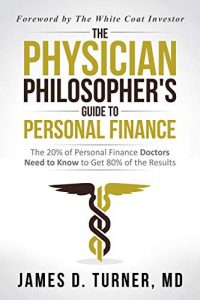
Book Review: The Physician Philosopher’s Guide to Personal Finance
This post may contain links from our sponsors. We provide you with accurate, reliable information. Learn more about how we make money and select our advertising partners.
[The Physician Philosopher's Course, Medical Degree to Financially Free, is available for enrollment until tomorrow, June 10th, 2020. You can check it out here.]
Here’s the spoiler: I wish this book existed when I was early in my career.
Dr. James Turner is an anesthesiologist who blogs as The Physician Philosopher and has a podcast, Money Meets Medicine, and a brand new course, Medical Degree to Financially Free.
His mission is to teach physicians how to create financial freedom. (sound familiar?)
He wrote the book The Physician Philosopher’s guide to Personal Finance to further that mission and provide the 20% of info that will have the best bang for your time and energy.
This book is not meant to be encyclopedic. It’s a book that you can read on a plane ride or on a quiet weekend.
It tackles almost all of the major questions that any medical student, resident, or young attending might have about how to set themselves up to be successful financially.
Why Do We Need This Book?
We all know that burnout is a huge issue in our community. I’m in total agreement with him that financial issues drive much of this burnout with physicians feeling trapped by rising student loan debt, increased costs of living, feeling like a cog in a machine with no say.
If you’re financially stable or independent you can make decisions out of desire and passion, not fear or insecurity.
He does an amazing job or distilling all of the major financial issues into an easy to read format, so I’ll try to do the same for his book.
What Are the Major Topics He Tackles?
- Financial Advisors – what do they do, how do they get paid, how can you best benefit with one, and what are the criteria you should use to select one
- Student Loans – the different loan programs out there, repayment, and refinancing
- Asset protection – the importance of various insurance (life & disability)
- Retirement Accounts – what are the different types and how to invest in them
- Life Balance – ultimately the most important topic in my opinion
 He even touches on physician side hustles.
He even touches on physician side hustles.
Knowing what my focus is on, I was looking out for anything real estate related of which you won’t find any in this book. But that makes absolute sense. He’s distilled things down to the essentials to put your feet on a solid journey.
I believe real estate should be something people are exposed to yet, but it’s also something for the majority they need some capital to invest in, that comes later.
No question, I’d recommend this book to all of the residents and medical students I teach. Financial education is a must for young doctors and doctors in training. The movement is happening and I have no doubt that this book and Dr. Jimmy Turner will be a leader in it
Key Summary
- It’s geared toward medical students, residents, and early career physicians
- Answers pretty much all of the basic questions that you might have as a physician on personal finance
- It acts as a guide to warn of pitfall and failures.
- I really appreciate how he creates a balance between obtaining Financial Independence as early as possible while still enjoying today.
You can check it out here:
The Physician Philosopher's Guide to Personal Finance.Disclaimer: The topic presented in this article is provided as general information and for educational purposes. It is not a substitute for professional advice. Accordingly, before taking action, consult with your team of professionals.

